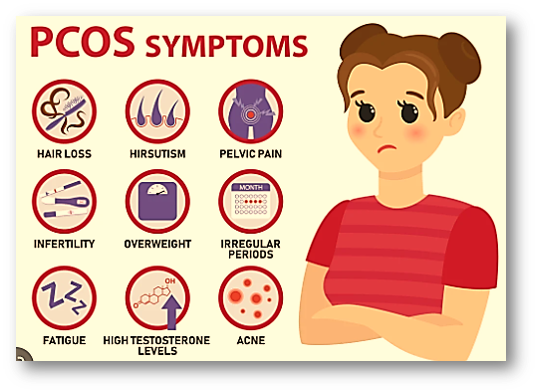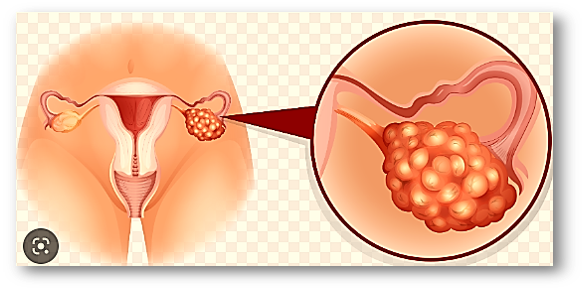Polycystic Ovary Syndrome (PCOS) and Polycystic Ovary Disease (PCOD) are often used interchangeably, but PCOS is the most commonly used term to describe the condition. PCOS is a hormonal disorder common among women of reproductive age and is characterized by the presence of cysts in the ovaries and symptoms such as irregular menstrual cycles, high levels of androgens (male hormones), and difficulty getting pregnant. PCOS OR PCOD
WHAT IS THE MAIN CAUSE OF PCOS??
The exact cause of Polycystic Ovary Syndrome (PCOS) is unknown, but it is believed to be the result of a combination of genetic and environmental factors. Some of the contributing factors to PCOS include:
Insulin resistance:
Women with PCOS often have high levels of insulin in their blood, which can lead to insulin resistance and increase the production of androgens (male hormones) by the ovaries.
Low-grade inflammation:
Chronic low-grade inflammation has been linked to the development of PCOS.
Hormonal imbalances:
Elevated levels of luteinizing hormone (LH) and testosterone, and low levels of follicle-stimulating hormone (FSH) can lead to the development of PCOS.
Heredity: PCOS OR PCOD
PCOS can run in families and may have a genetic component.
Obesity:
Excess weight, particularly around the waist, can increase the risk of developing insulin resistance and PCOS.
It is important to note that the exact cause of PCOS is not fully understood, and more research is needed to better understand the underlying mechanisms of the condition.
WHAT DOES PCOS DO TO A WOMAN??

Polycystic Ovary Syndrome (PCOS) can have a significant impact on a woman’s physical, emotional, and reproductive health. Some of the effects of PCOS include:
Menstrual irregularities:
Women with PCOS often experience irregular or absent menstrual periods, which can make it difficult to become pregnant.
Hormonal imbalances:
Elevated levels of androgens (male hormones) can lead to symptoms such as excessive hair growth (hirsutism), acne, and male-pattern baldness.
Infertility:
PCOS can make it difficult for women to become pregnant due to irregular ovulation.
Metabolic disorders:
Women with PCOS are at increased risk of developing insulin resistance, type 2 diabetes, and metabolic syndrome.
Mental health:
PCOS can also have a negative impact on a woman’s mental health, leading to symptoms such as depression, anxiety, and body dysmorphia.
Cardiovascular disease:
Women with PCOS are at increased risk of developing cardiovascular disease, due in part to the associated metabolic and hormonal imbalances.
It is important for women with PCOS to work closely with their healthcare providers to manage their symptoms and reduce the potential negative effects of the condition on their health.
HOW DO YOU KNOW THAT YOU HAVE PCOS??
Polycystic Ovary Syndrome (PCOS) is diagnosed based on a combination of symptoms, physical examination, and diagnostic tests. Some common signs and symptoms of PCOS include:
- Irregular menstrual cycles or absent periods
- Excessive hair growth (hirsutism) on the face, chest, abdomen, or back
- Acne or oily skin
- Male-pattern baldness or thinning hair
- Obesity, particularly with excess weight around the waist
- Dark, thick patches of skin (acanthosis nigricans)
- Infertility or difficulty becoming pregnant
DIAGNOSIS OF PCOS!!

Diagnosis of PCOS is typically based on the presence of at least two of the following criteria:
- Irregular menstrual cycles or evidence of elevated androgen levels
- Polycystic ovaries as seen on ultrasound
- Clinical or biochemical signs of hyperandrogenism (elevated male hormone levels)
In addition to a physical examination and assessment of symptoms, diagnostic tests for PCOS may include:
- Blood tests to measure hormone levels, including testosterone, luteinizing hormone (LH), and follicle-stimulating hormone (FSH)
- Ultrasound to visualize the ovaries and look for cysts
- Glucose tolerance test to assess for insulin resistance and type 2 diabetes
It is important to consult a healthcare provider if you have any concerns about your menstrual cycles or other symptoms that may be indicative of PCOS. They can help diagnose and manage the condition, and ensure that you receive the appropriate care and support.
IS PCOS A SERIOUS PROBLEM??
Polycystic Ovary Syndrome (PCOS) is a common and serious health condition that can have significant impacts on a woman’s physical and emotional health. Some of the potential consequences of PCOS include:
Infertility:
Diet changes: PCOS OR PCOD
PCOS can make it difficult for women to become pregnant and may require medical intervention to achieve pregnancy.
Metabolic disorders:
Women with PCOS are at increased risk of developing insulin resistance, type 2 diabetes, and metabolic syndrome, which can increase the risk of heart disease and other health problems.
Hormonal imbalances:
Elevated levels of androgens (male hormones) can lead to symptoms such as excessive hair growth, acne, and male-pattern baldness, which can impact a woman’s self-esteem and body image.
Mental health:
PCOS can also have a negative impact on a woman’s mental health, leading to symptoms such as depression, anxiety, and body dysmorphia.
Cardiovascular disease:
Women with PCOS are at increased risk of developing cardiovascular disease, which can impact their overall health and longevity.
Therefore, it is important to take PCOS seriously and work closely with a healthcare provider to manage symptoms and reduce the potential negative effects of the condition on your health. Early diagnosis and treatment can help prevent or reduce the risk of these long-term consequences.
AT WHAT AGE PCOS CAN START!!
Polycystic Ovary Syndrome (PCOS) can develop at any age during a woman’s reproductive years, typically between the ages of puberty and menopause. However, it is most commonly diagnosed in women in their late teens to early 30s.
PCOS is a chronic condition that can persist throughout a woman’s life, and its symptoms may change or worsen over time. It is important to seek medical advice if you have symptoms or concerns about PCOS, regardless of your age. Early diagnosis and treatment can help reduce the risk of long-term health consequences and improve quality of life.
HERBAL OR HOME REMEDIES FOR PCOS!!

While there is no cure for Polycystic Ovary Syndrome (PCOS), there are several lifestyle changes and natural remedies that can help manage symptoms and reduce the risk of associated health problems. Some of the most commonly recommended herbal and home remedies for PCOS include:
Diet changes: PCOS OR PCOD
A diet that is low in processed carbohydrates, high in fiber, and rich in fruits and vegetables can help regulate insulin levels and improve symptoms of PCOS.
Exercise:
Regular physical activity, such as brisk walking, running, or cycling, can help regulate hormones, reduce insulin resistance, and improve symptoms of PCOS.
Herbal remedies:
Certain herbs, such as cinnamon, fenugreek, and saw palmetto, may help regulate insulin levels and improve symptoms of PCOS.
Vitamin and mineral supplements:
Supplements such as magnesium, vitamin D, and myoinositol can help regulate insulin levels and improve symptoms of PCOS.
Stress management:
Techniques such as yoga, meditation, and deep breathing can help reduce stress and improve overall well-being in women with PCOS.
It is important to remember that herbal and home remedies should be used in conjunction with conventional medical treatment and under the guidance of a healthcare provider. Some remedies may interact with medications or have potential side effects, so it is essential to seek professional advice before using them.
MYTHS AND FACTS ABOUT PCOS!!
There are many myths and misconceptions about Polycystic Ovary Syndrome (PCOS), which can lead to misunderstandings and mismanagement of the condition. Here are some common myths and facts about PCOS:
Myth: PCOS is caused by eating too much sugar or carbohydrates.
Fact: The exact cause of PCOS is not known, but it is thought to be related to hormonal imbalances and insulin resistance. Diet may play a role, but it is not the sole cause of the condition.
Myth: PCOS only affects overweight women.
Fact: While obesity is a risk factor for PCOS, the condition can affect women of all sizes and body types. Thin women can also develop PCOS.
Myth: PCOS is not a serious health condition.
Fact: PCOS is a serious and potentially life-threatening condition that can lead to infertility, metabolic disorders, and an increased risk of cardiovascular disease. Early diagnosis and treatment are essential to reduce the risk of long-term health consequences.
Myth: PCOS only causes menstrual irregularities.
Fact: PCOS can cause a wide range of symptoms, including irregular menstrual cycles, hirsutism, acne, male-pattern baldness, weight gain, and insulin resistance.
Myth: PCOS is a temporary condition that goes away after pregnancy.
Fact: PCOS is a chronic condition that can persist throughout a woman’s life. While some symptoms may improve during pregnancy, the underlying hormonal imbalances and insulin resistance can persist.
It is important to seek accurate information and professional medical advice to manage and treat PCOS effectively. Misunderstandings about the condition can lead to delayed diagnosis and ineffective treatment, so it is essential to educate yourself and work closely with a healthcare provider.
KEYWORDS: PCOS OR PCOD
Polycystic Ovary Syndrome (PCOS), hormones, insulin resistance, menstrual irregularities, hirsutism, acne, male-pattern baldness, weight gain, metabolic disorders, cardiovascular disease, infertility, chronic condition, lifestyle changes, natural remedies, herbal remedies, vitamin and mineral supplements, stress management, diet, exercise, yoga, meditation, deep breathing, conventional medical treatment, myths, misconceptions. https://lifebiologs.com/calorie-count-find-the-balance/
REFERENCES:
https://www.mayoclinic.org/diseases-conditions/pcos/symptoms-causes/syc-20353439
https://www.healthline.com/health/polycystic-ovary-disease

